Celebrating Native American Heritage Month
By April Miller, UO Alumni Association assistant director of marketing and communications; Sage Kiernan-Sherrow, MA ’21 (journalism), UOAA copywriter/editor; and Olivia Arciniega, class of 2025, UOAA student writer/editor
The UO Alumni Association recognizes and honors the Native people who have called this land home for thousands of years. This month and every month, we celebrate the many contributions of Indigenous UO alumni, students, and faculty in their communities, at the university, and across the land we now refer to as Oregon and the US.
November is Native American Heritage Month, a time to honor the traditions, stories, and cultures of Native American, Alaska Native, Native Hawaiian, and other Indigenous communities throughout the land we now call Oregon and the US. It’s also a time to reflect on the Indigenous homelands on which we now live and work, and to take accountability.
For thousands of years, Indigenous tribes have lived in Oregon—fishing, hunting, gathering, trading, and stewarding the land. Native Americans occupied every diverse landscape in the state, from forests to valleys to deserts to coastal regions, the Cascade Mountains, and more.
But by the 1840s, White settlers living in the eastern and mid-US were moving west and, in doing so, they upended Native ways of life. It’s estimated that 300,000 to 500,000 people traveled to the Pacific Northwest between 1841 and 1884 along the Oregon Trail—an approximately 2,000-mile route from Independence, Missouri, to the Willamette Valley. In 1850, Congress passed the Oregon Donation Land Act, further encouraging settlement of the Oregon Territory and giving White male settlers 320-acre claims (or 640-acre claims for married couples). In tandem with this act and following treaties between 1851 and 1855, the US government dispossessed Native peoples of their Indigenous homeland and forcibly removed them to reservations. This includes the Kalapuya people, on whose traditional Indigenous homeland, Kalapuya Ilihi, the UO is located.
University of Oregon is located on Kalapuya Ilihi, the traditional Indigenous homeland of the Kalapuya people. Following treaties between 1851 and 1855, Kalapuya people were dispossessed of their Indigenous homeland by the United States government and forcibly removed to the Coast Reservation in Western Oregon. Today, descendants are citizens of the Confederated Tribes of Grand Ronde Community of Oregon and the Confederated Tribes of Siletz Indians of Oregon, and continue to make important contributions in their communities, at UO, and across the land we now refer to as Oregon and throughout the globe.
Today, Native Americans make up approximately 4% of Oregon’s population; this equates to around 177,000 people. There are nine federally recognized, sovereign tribes in Oregon, representing a wide diversity of ancestries—each with their own individual history, culture, and language and/or dialects. Click each tribe’s name below to learn more about their history and heritage.
1,844
UO alumni self-identifying as Native American or Alaska Native
0.6%
Percentage of UO student body that is Native American (as of fall 2022)
3%
Percentage of UO class of 2027 that is Native American or Alaska Native
Native Ducks who've made a difference
In the Iroquois Nation, there is a concept called the Seventh Generation Principle, which carries the belief that decisions made today should result in a sustainable world seven generations into the future. We want to honor the Native alumni and changemakers who have contributed to this philosophy through their work at the UO. Native alumni have impacted every facet of the university, from athletics to art, education to conservation, diplomacy, and more. The UO would not be the same, nor would it have achieved its level of success, without their perspectives and the work they’ve done to expand cultural understanding and serve as representatives for generations to come.
The Native individuals below have helped make the university and our surrounding communities strong. This list includes individuals both living and deceased, as we feel it is important to honor the memory of elders who paved the way. We know that not every Native individual who has made a difference at the UO is on this list but hope that it will serve as a reminder of the resiliency of the Native community.
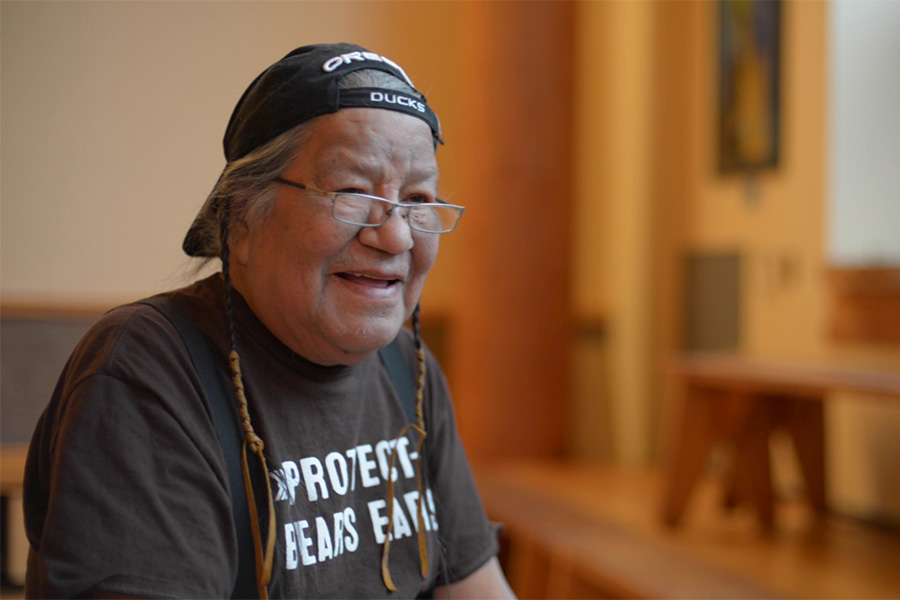
Gordon Bettles (Klamath), MS ’03 (individualized program: anthropology, linguistics, international studies)
Gordon Bettles was the first steward of the University of Oregon’s Many Nations Longhouse, where he served the UO’s Indigenous student community from 2003 to 2015. He died in 2020.
In addition to his role of steward, Bettles took on the role of director of Native American initiatives for the university in 2013, facilitating consultation with Native American tribes and organizations and providing assistance to the local Native population.
Of his many contributions to the university, the Oregon Flagpole Project is one of the most notable. In 2012, as part of a class project, students from the Lundquist College of Business proposed placing flagpoles flying the emblems of Oregon’s Native American tribal nations in a central location on the Eugene campus. Bettles became project advisor, and the effort quickly won support from other Native groups on campus. In October 2014, the nine flags were raised in the EMU Amphitheater, where they remain to this day.
In a 2014 interview with the Oregon Folklife Network, Bettles said his favorite part of the project was “seeing my flag go up . . . on equal footing with the other tribes . . . No other people in the state of Oregon have the status that we do as Oregon’s first inhabitants and that sets us apart and makes us unique, but it also shows that no matter [what] is thrown at us we have the will to survive as a people.”
Throughout Bettles’s life, he was a musician, composer, business manager, and community youth services worker while serving his
Klamath Tribe as cultural and heritage director for more than a decade before continuing his education at the University of Oregon. His legacy lives on through his children and grandchildren.
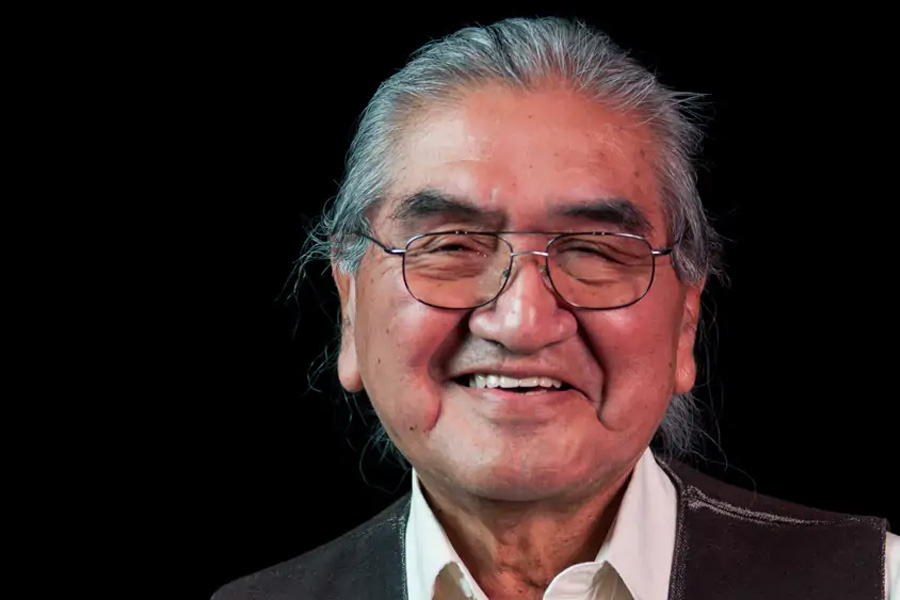
Antone Minthorn (Umatilla)
Antone Minthorn, whose Native name translates to “Big Dawn,” has served for more than twenty years with the Confederated Tribes of the Umatilla Indian Reservation (CTUIR) in various roles, from chief planner to chair of the board of trustees.
He attended the University of Oregon, working toward a graduate degree in urban planning, and, during his time as a student, helped start the Native American Student Union (NASU) and secure the old army barrack that served as the community longhouse for decades before the new longhouse was built. He later became the director of NASU.
Minthorn has been a board member of more than fifteen community organizations, including Confluence and Ecotrust. Confluence connects the history, living cultures, and ecology of the Columbia River system through Indigenous voices, while Ecotrust inspires fresh thinking that creates economic opportunity, social equity, and environmental well-being.
Minthorn's many major accomplishments include serving as an Oregon delegate to seven Democratic national conventions and working with the San Franscisco City Council to address housing for the Bureau of Indian Affairs Relocation Program at the height of the Civil Rights Movement. He considers his most important contribution to be the restoration of water and salmon, after an absence of seventy years, to the Umatilla River. For this accomplishment, the Columbia River Inter-Tribal Fish Commission honored Minthorn with a lifetime achievement award.
As a Marine veteran, Minthorn believes in proactive thinking. He is helping build a strong economy for the CTUIR community and advocates for the protection of treaty rights and the restoration of the Cayuse-Nez Perce, Umatilla, and Walla Walla languages. His daughter, Modesta Minthorn, BS ’93 (political science), MA ’05 (linguistics) was just hired as Portland State University's first executive director of Tribal Relations.
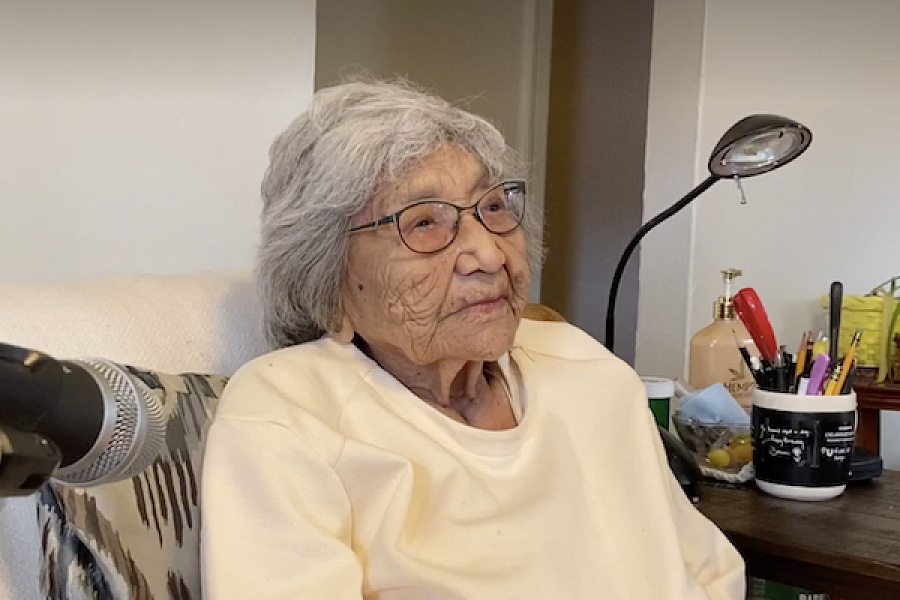
Virginia Beavert (Yakama), PhD ’12 (linguistics)
Virginia Beavert, also known as Tuxámshish, is one of our oldest living alumni, turning 102 November 30. A Yakama Nation elder, she has dedicated her life to the preservation of her Native language.
Beavert was a nontraditional student, returning to her education in her forties before achieving a doctorate in linguistics from the University of Oregon at age ninety. Prior, she served in the Women’s Army Corps in New Mexico during WWII and, upon returning, helped her stepfather finish his work on recording the Ichishkíin language. She also worked closely with the late anthropologist Melville Jacobs.
Beavert was the first woman to be elected to the Yakama Nation general council and served from 1974 to 1985. She has received numerous fellowships, awards, and honors for her cultural work, including the Washington State Indian Education Association Educator of the Year Award, the Linguistic Society of America’s Kenneth L. Hale Prize, and the National Endowment of the Humanities Faculty Research Award. In 2004, she was honored by the Indigenous Language Institute for her lifetime of work on language revitalization and in 2008, she received the Distinguished Service Award from the University of Oregon. She was a key planner of the Yakama exhibit at the Smithsonian Institution’s National Museum of the American Indian and is the coauthor of the Yakama Sahaptin Dictionary.
Today, she remains active in teaching and mentorship through the UO’s Northwest Indian Language Institute, the Sapsik’ʷałá Teacher Education Program, and more. She has been a keynote speaker at the UO’s Native student graduation several times, focusing on the responsibility and privilege of returning institutional knowledge to tribal communities.
Her most recent accomplishment is the publication of Anakú Iwachá (The Way it Was), a collection of Yakama legends and short stories.
Learn more about Virginia Beavert in this Around the O article.
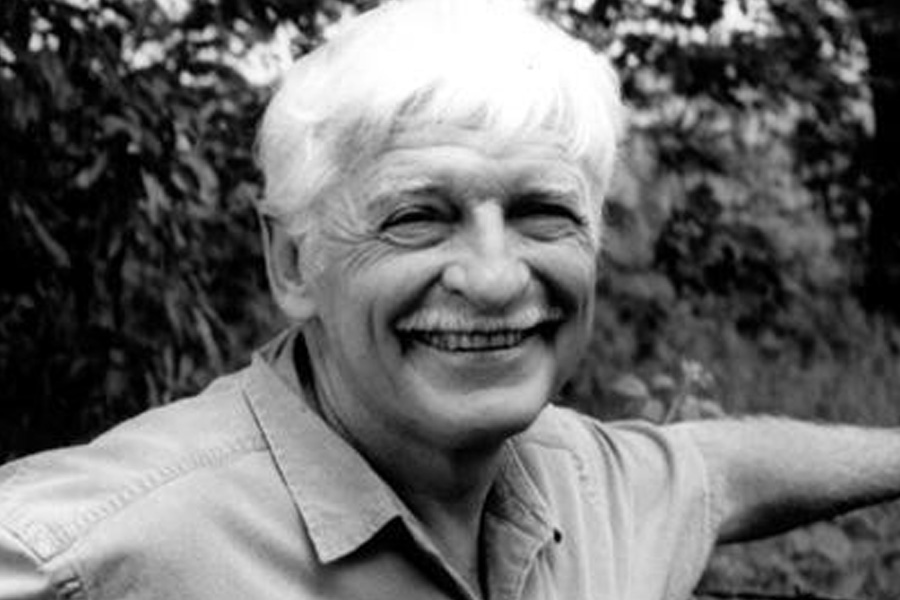
Ralph James Salisbury (Cherokee, Shawnee)
Ralph Salisbury (1926–2017), was a disciplined and prolific author whose work reflects his mixed ancestry, his childhood in Iowa during the Great Depression, his love of family and friends, his pacifism, and what he described as a "devotion to harmony with nature."
Salisbury published eleven collections of poetry—two of which were finalists for the Oregon Book Award—and three collections of short fiction. His memoir, So Far, So Good (2013), received the River Teeth Book Prize for Literary Nonfiction and his poem "In the Children's Museum in Nashville," published in the New Yorker in 1960, made him one of the first Native American poets to receive national attention.
Among Salisbury’s many additional accomplishments was his tenure as a beloved professor at the University of Oregon, where he taught from 1960 to 1994. He helped create and later directed the MFA in creative writing program and his far-reaching influence as teacher and friend is carried on in the lives of his students, many of whom have gone on to distinguished literary careers.
A WWII veteran, father of three, and grandfather of four, Salisbury lived in Eugene with poet Ingrid Wendt, MFA ’68 (creative writing), his wife of forty-eight years. His poems continue to appear posthumously in literary journals and anthologies; more information about his work and sample poems can be found on his website.
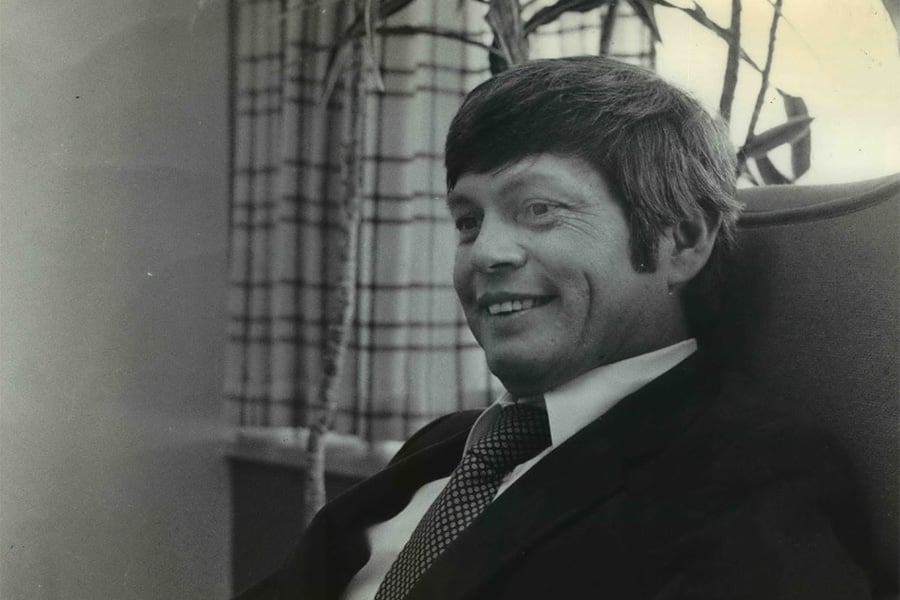
Ken Smith (Warm Springs), BS ’59 (business administration)
Kenneth Smith, “Walladawish,” was an influential leader of the Confederated Tribes of Warm Springs.
Born in 1935, Smith was raised with the teachings of hard work, self-reliance, and the importance of education from his grandparents. He carried these lessons throughout his time at the University of Oregon, where he was just the second Native American to graduate. Smith held prominent positions in the Confederated Tribes of Warm Springs, including head accountant, assistant general manager, and general manager. He was also an elected member of the tenth tribal council for three years. Under his leadership, the Warm Springs Power Enterprise was completed.
Smith made an impact nationally, as well. He served as the assistant secretary of the Interior Department for Indian Affairs under President Ronald Reagan and helped provide services to more than 190 Alaska Native organizations. He also allocated fifty-two million acres of trust land for Native peoples. Later, Smith dedicated his time to the betterment of tribal members in Warm Springs as their chief executive officer and secretary-treasurer. This included helping to create a cultural museum, an early childhood education center, and a health and wellness center.
Smith died May 13, 2020, in Warm Springs.
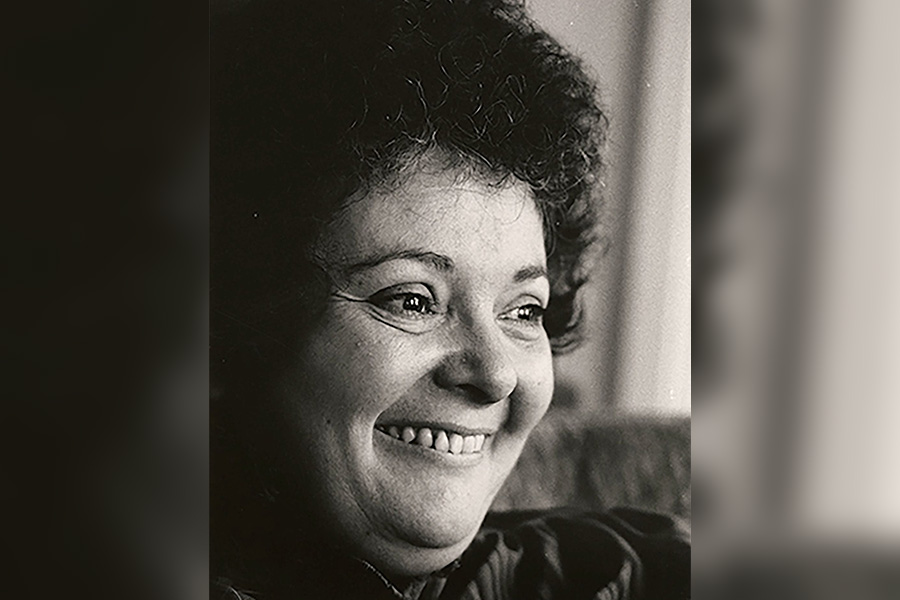
Paula Gunn Allen (Laguna, Sioux), BA ’66 (English), MFA ’68 (creative writing)
Paula Gunn Allen was a poet and advocate for Native American, lesbian, and women’s rights. Born in 1939 in Albuquerque, New Mexico, Allen was of mixed heritage, including Laguna, Sioux, and Lebanese-American ancestry. In 1966, Allen earned her BA in English literature, and, shortly after, her MFA in creative writing in 1968, both from the University of Oregon. She went on to earn her PhD at the University of New Mexico, where she focused on Native American studies.
Her first published work, The Blind Lion, came out as she was working toward her PhD. While working as an author, she also held many teaching jobs at universities including the University of California, Los Angeles, the College of San Mateo, and San Diego State University. She was devoted to her teachings and writings and conveyed the importance of Native American heritage. Allen’s notable anthologies include Spider Woman’s Granddaughters: Traditional Tales and Contemporary Writing by Native American Women and Voice of the Turtle: American Indian Literature, 1900–1970.
Allen completed her first novel, The Woman Who Owned the Shadows, in 1983. It focuses on tribal traditions, including songs, rituals, and legends. Her feminist advocacy, however, is best displayed in The Sacred Hoop: Recovering the Feminine in American Indian Traditions. In this work, she argued for the compatibility between feminist ideas and Native American perspectives. Allen’s works earned her the American Book Award, the Native American Prize for Literature, the Lifetime Achievement Award by the Native Writers’ Circle of the Americas, and more.
Allen died in 2008, but her legacy remains.
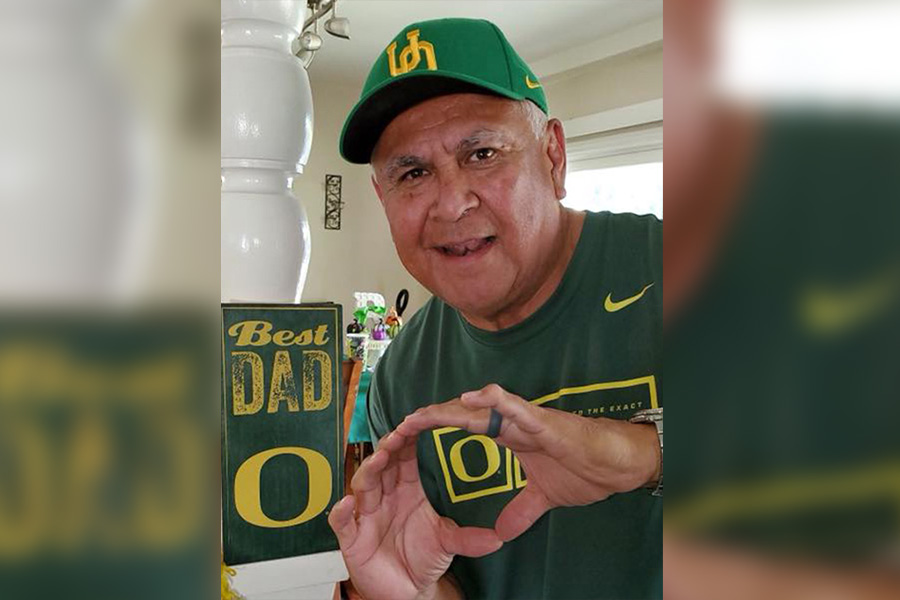
Rudy Bryan (Fort Mojave, Chemehuevi, Mexican American), BS ’79 (public affairs)
Raised in Barstow, California, Rudy Bryan was the first in his family to go to college and one of the few Native students to ever play for Ducks football. During his senior year, he worked at the Eugene Indian Center, which was an inspiring experience for him. He was celebrated as an honorary captain in 2012 and for his work with the Native American Student Union while a student.
After graduating from the UO, Bryan worked as the director of a YMCA and also in the parks and recreation department in Needles, California. Later, he worked for ITT Exelis and NASA on their Deep Space Network team. The team is responsible for the maintenance and operation of the Goldstone Deep Space Communication Complex, whose antennas are used to communicate with satellites millions of miles away. Most recently, Bryan was an occupational safety, environmental, and health manager for Peraton, based in Southern California. He has since retired.
Throughout his life, Bryan sat on various boards and committees, including the Mojave tribe's Economics Development advisory board, Housing board, and Tribal Election board. Bryan is passionate about youth advocacy and education and was a youth basketball and baseball coach. He also frequently gave presentations about the culture of the Mojave to elementary schools in California. Today, Bryan remains a supporter of the Sapsik’ʷałá Teacher Education Program and can still be found attending Ducks games alongside his two sons, who followed in his footsteps and became football players. He plans to continue supporting his tribe during retirement and help his children and grandchildren keep score during all their sports matches.
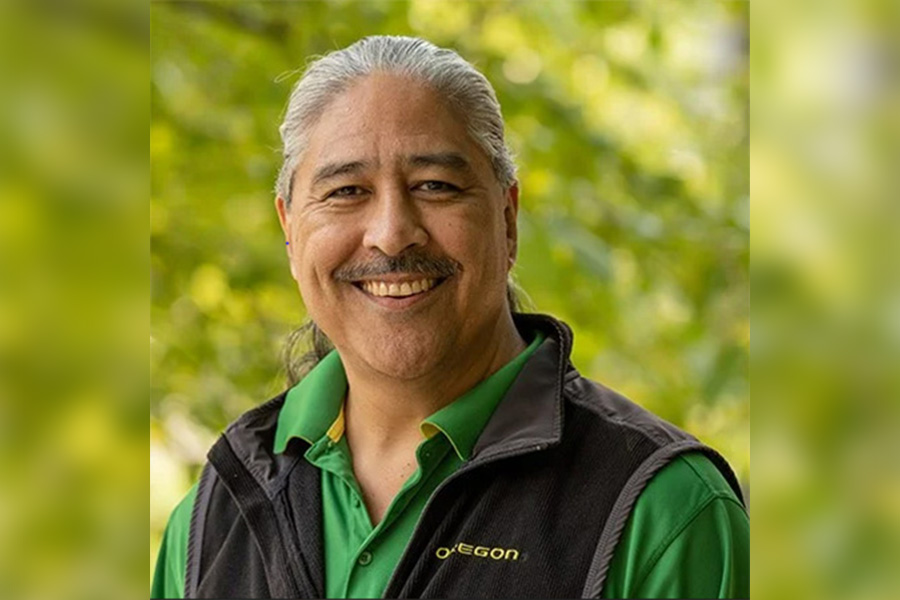
Jason Younker (Coquille), MS ’97, PhD ’03 (anthropology)
Originally from Charleston, Oregon, Jason Younker, PhD, is an associate professor of cultural anthropology at the UO, the assistant vice president and advisor to the president on sovereignty and government-to-government relations, and the chief of the Coquille Indian Tribe. He has worked with all facets of the university to create, highlight, and support Native-led initiatives and programming.
Younker graduated with a bachelor's degree from Cameron University in 1990 before attending the University of Oregon for his master's degree and PhD. During his studies at the UO, he was a leader in the Southwest Oregon Research Project at the Smithsonian Institution and helped return documents relating to their cultural heritage to the nine federally recognized tribes and the historic fifty-four bands and tribes that occupied Oregon. Prior to that, Younker taught at the Rochester Institute of Technology for more than a decade and served as the president of the Association of Indigenous Anthropologists.
Younker has held numerous fellowships, is a chair of multiple committees, and has authored many grants and publications. In 2018, he was asked by former Oregon Governor Kate Brown to help develop state guidelines for the management of Native American artifacts and, more recently, helped launch the Home Flight Scholars Program at the UO. As a part of that program, Younker enlisted his brother, Shirod, and niece and UO alum, Kale’a Calica-Younker, BFA ’22 (art), to design the Home Flight blanket, with proceeds supporting the Home Flight scholarship.
Younker received the prestigious Ely S. Parker Award from the American Indian Science and Engineering Society in 2014 for his work with tribal governments and students in higher education. He was elected chief of the Coquille Indian Tribe in 2021, following Chief Don Ivy’s death. His son is also a UO alum.
Hear more on Jason Younker with Jefferson Public Radio.
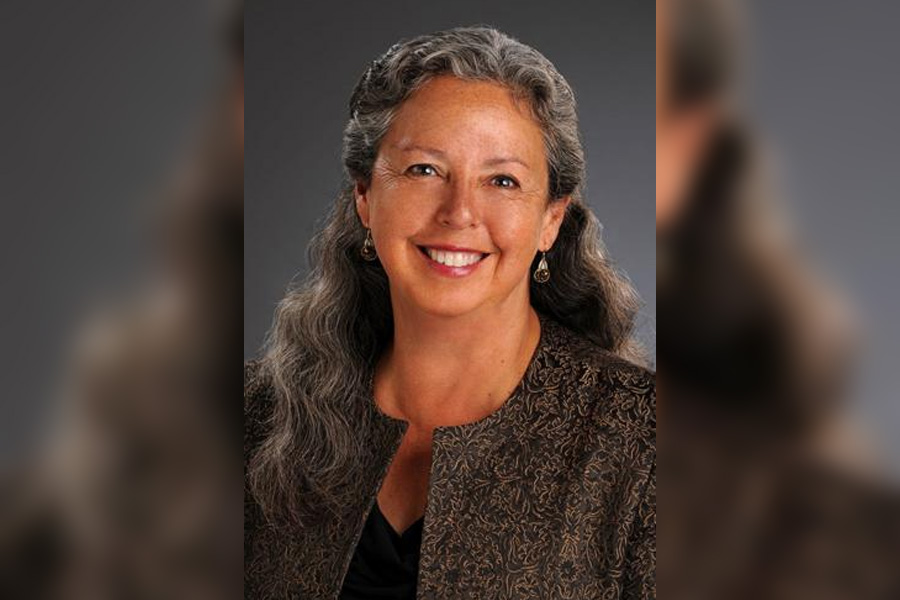
Roberta "Bobbie" Conner (Cayuse, Umatilla, Nez Perce), BS ’77 (journalism)
Roberta "Bobbie" Conner, also known as “Sísaawipam", grew up on the Umatilla Indian Reservation. She was the feature editor of the Pendleton High School Lantern newspaper and went on to pursue a journalism degree with a focus on public relations at the University of Oregon, where she also wrote for the Daily Emerald. After graduation, she achieved her master’s in management from Willamette University, then worked for the US Small Business Administration for eleven years. Since 1998, she has been the director of the Tamástslikt Cultural Institute in Pendleton.
Conner is on multiple boards and committees, including Eastern Oregon University’s board of trustees, the Ecotrust board of directors, the Tribes’ land acquisition committee, and the Tamkaliks Celebration Committee. She chaired the Board of Trustees for the National Museum of the American Indian in 2012 and 2013 and served on the Board of Directors for the American Alliance of Museums from 2008 to 2014.
Conner has written essays and contributed to books about Native history. In 2013, she was inducted into the UO School of Journalism and Communication’s Hall of Achievement, and remains active with the university. In 2022, Conner co-taught a class with Michael Moffitt, Oregon Law and Clark Honors College professor and Phillip H. Knight Chair. The two investigated the lives and deaths of the Cayuse Five, a group of Native men who were falsely accused of murder, executed, and buried in unmarked graves.
Conner is an activist with a special emphasis on how the division into tribal nations and segregation into boarding schools has impacted Indigenous cultures, tribal land rights, sustainability, and the repatriation of human remains and funerary objects to Native American lands. Most recently, she won the 2023 Governor’s Tourism Award.
Creating pathways for Indigenous student success
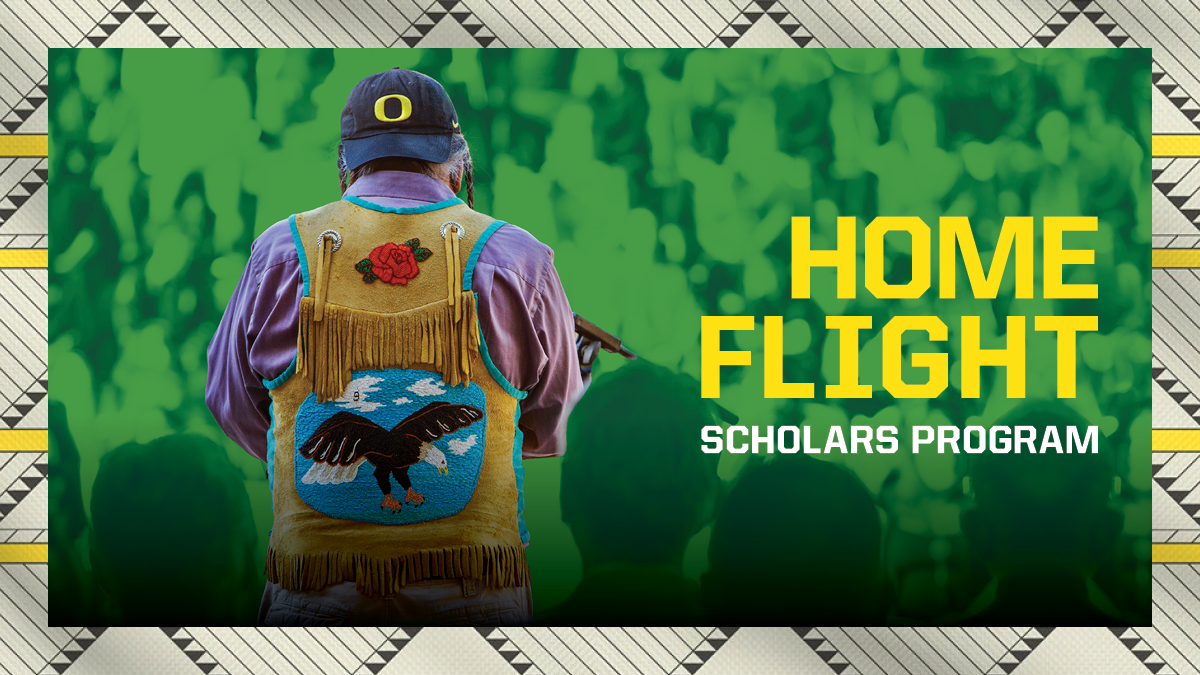
The Home Flight Scholars Program supports the long-term success of Native American students.
Launched in October 2022, the Home Flight Scholars Program offers coverage of full tuition and fee costs for all Oregon residents who are enrolled citizens of a federally recognized tribe and currently enrolled in an undergraduate program.
In addition to this financial assistance, Home Flight enhances mentorship opportunities for Native students, developing a culture-rich program for new students. The program is an effort to address three major factors the university identified in consultation with the UO Native American Advisory Council: financial hardships, academic difficulties, and lack of cultural connectedness.
Upon its launch last fall, the program was made immediately available to an estimated 150 to 175 students. Home Flight aims to recruit top scholars, boost the retention and graduation rates of Native students, and expand the representation of Native Americans and Alaska Natives in the state’s workforce.
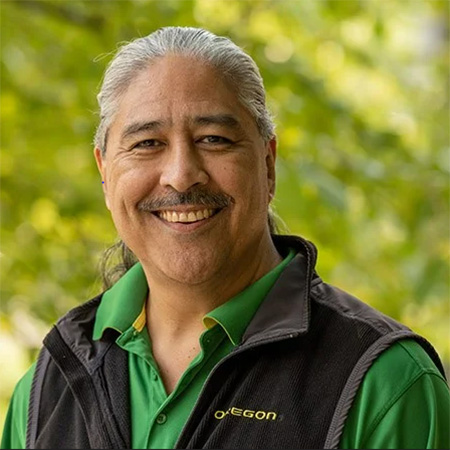
“The UO has one of the more complete support programs for citizens of federally recognized tribes through the Home Flight Scholars Program, featuring scholarships, academic programs, community living, Many Nations Longhouse, a food pantry, and community potluck dinners. The question for future Native scholars is no longer ‘can I go to college,' but 'where should I go to college?’”
—Jason Younker
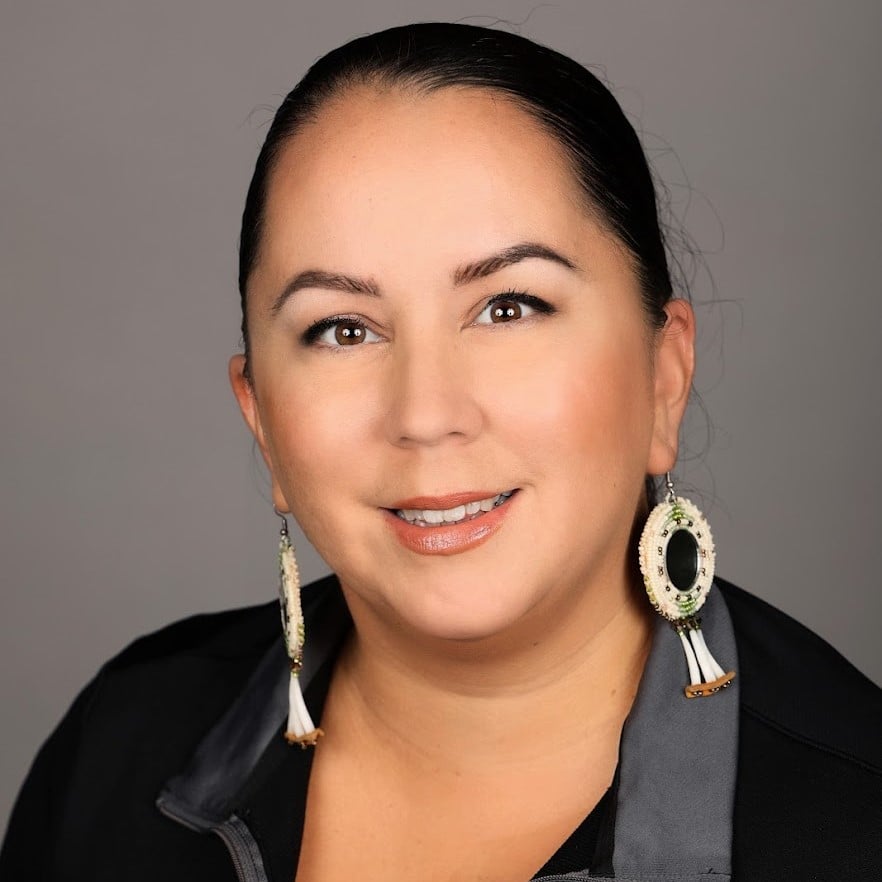
“As an Indigenous Native American Duck alum, my time at the University of Oregon was priceless to me. I was given a formative education and found not only educators, but mentors. I was given the skills I needed to pursue the enactment of lasting change in our community. Since graduating, I have worked with our communities’ most vulnerable members and lent a helping hand imbued with intense compassion for those I serve.”
—Jolene Bettles (Klamath), BS ’19 (sociology), supportive housing navigator at HIV Alliance, UO Alumni Association board member
Home Flight Blankets
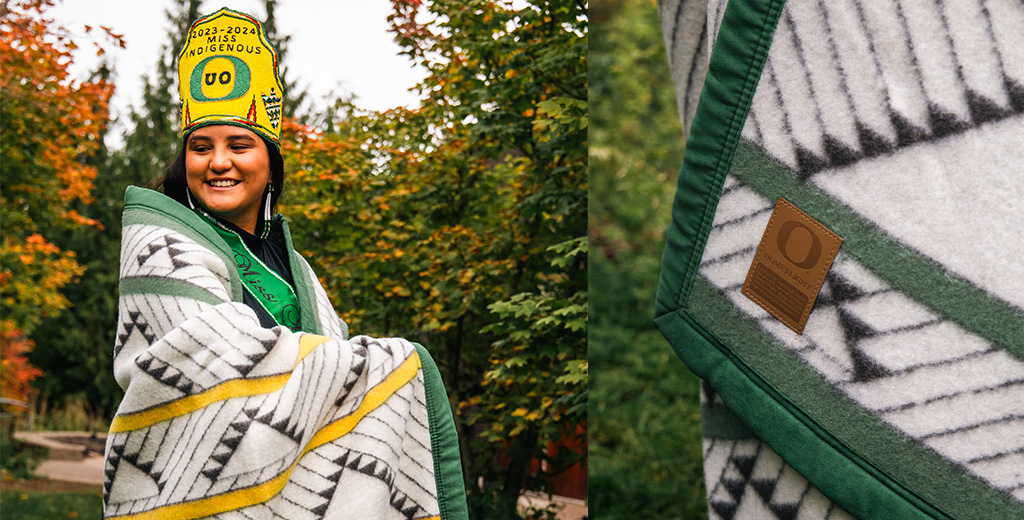
Supporting Native students and alumni
In support of the UO's Native community, the UO Alumni Association is excited to again partner with the Office of the President through the sale of Home Flight blankets. Native-designed, UO student-designed, and produced by Eighth Generation, all proceeds benefit Native students and alumni through the Many Nations Longhouse and the Native Duck Nation Alumni Network in collaboration with The Duck Store.
Launched in February 2022, the first batch of blankets sold out in just three weeks. This year, 300 blankets were made available for purchase, with public sales beginning November 1. Support Native UO students and alumni by purchasing a Home Flight blanket this fall before supply runs out. They’re an Oregon heirloom that makes a wonderful gift sure to be loved by generations to come.
Purchase a Home Flight blanket
Sapsik'ʷałá Teacher Education Program
The Sapsik’ʷałá Teacher Education Program, part of the UO’s College of Education, creates pathways for Indigenous people to teach in tribal communities.
Started in 2002, the program collaborates with the nine federally recognized, sovereign tribes in Oregon and the UOTeach master’s program to train Native teachers through Indigenous methodologies. The program is named for the Ichishkíin/Sahaptin word which translates to “teacher" in English.
Sapsik’ʷałá scholars are awarded a grant covering tuition, books, a computer, living stipend, and dependent allowance. In turn, participants teach for two years in schools with large Native American student populations.
To date, 116 program alumni representing forty-nine tribes are teaching in tribal communities. Read Sapsik’ʷałá stories below.
Miss Indigenous University of Oregon
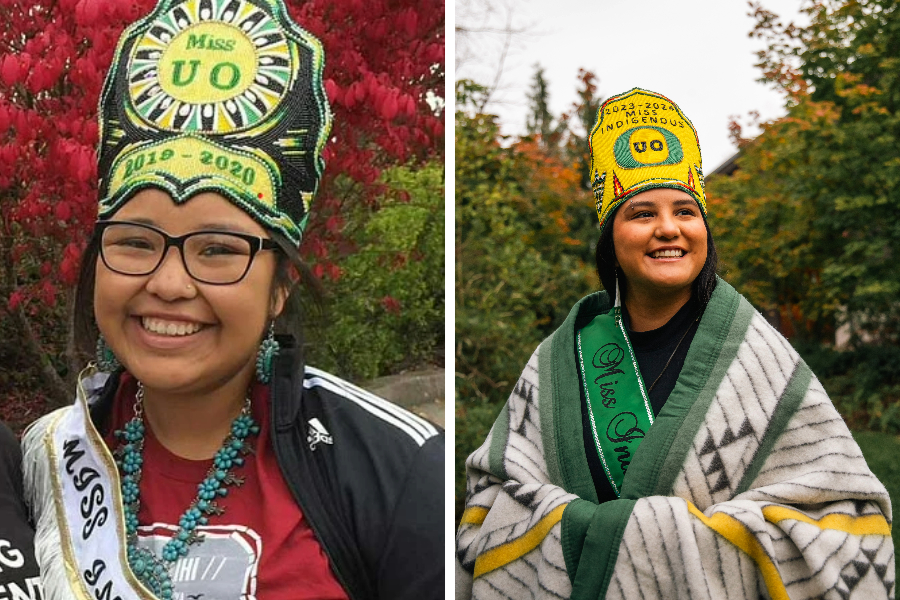
Raising cultural awareness and celebrating Indigenous heritage
The Miss Indigenous UO program first began as the passion project of Allyson Alvarado, BA ’21 (environmental studies), MA ’22 (language teaching studies). It represents a dedication and commitment to education, leadership, and cultural awareness through the promotion of Indigenous ideals. Now, it’s a fully fledged student-led program that has expanded to include a royal court and the Mr. Indigenous and Cultural Ambassador titles.
Michaela Begay (Diné, Akimel O’odham, Tohono O’odham), BA ’23 (family and human services), was the first person to be crowned as Miss Indigenous UO when the program launched in 2019. A long fascination with Native pageants such as Miss Indigenous World and Miss Navajo Nation—as well her own experience being crowned Diné Queen during her junior year of high school—inspired her to try out for the program. For her modern talent, she programmed a timed calculator, and for the cultural portion, she performed a traditional Navajo basket dance. Begay hopes the Miss and Mr. Indigenous University of Oregon Royalty Court will continue to expand and that the local and surrounding communities will embrace them.
“They’re students who have a lot going on and want to do these big and honorable things but need the support and resources and encouragement to do it as well as invitations and recognition outside of just campus,” she says.
For Begay, the Native American Student Union (NASU) and the UO became a “home away from home,” after moving to Eugene with few connections and without ever having visited campus. She always wanted to work with Indigenous youth, but she never thought she’d extend her education through the UOTeach master’s and Sapsik’ʷałá programs. Begay is currently placed in a fifth-grade classroom in the Bethel School District and enjoys teaching math and culturally relevant and Indigenized curriculum that fosters joy, identity, and resiliency. Her dream is to live and work in the Warm Springs community where her partner is from and to one day extend her skills to provide resources and outreach for Native communities.
“My big thing is wanting to see Indigenous youth achieve. I didn’t have many Indigenous educators or teachers of color until I got to university and it’s nice for students of color to see other students of color achieving. Both my tribes have helped me a lot with my education, and they want the best for all communities’ youth to strive in their education,” says Begay.
The Miss Indigenous title has been passed down three times and Keyen Singer, class of 2026 (environmental studies), is the current holder. NASU hopes this tradition will last generations and become celebrated throughout Native Duck Nation and our many alumni groups.
Upcoming Events
Throughout the month of November, the university community is celebrating Native American Heritage Month with a variety of events, including Native-themed films, speakers, and more.
Some of the events are recurring, such as Culture and Community Nights at the Many Nations Longhouse, while others like a movie night hosted by NASU are unique to Native American Heritage Month. Click here to view a full list of events and learn more.
Related Articles
Tony Aaron Fuller, BS '05 (electronic media production) — Alum aims to expand American Indian representation
Tracie Jackson, BS '03 (material and product studies) — Indigenous Designer and UO Alumna Tracie Jackson Featured on the UO BE Series
Jana Schmieding, BA '05 (theatre arts) — Native Voice: Jana Schmieding, Rutherford Falls
Amber Starks, BS '03 (general science) — Amber Starks, Common Reading and Technologies of Resistance
Katherine "Katie" Staton, MS '10 (conflict and dispute resolution), JD '10 — Duck grad named steward of Many Nations Longhouse
Amy Bowers Cordalis, BS '03 (political science) — Activist, alumna Amy Cordalis is 2023 commencement speaker
George Wasson, BM '69 (music), MS '71 (counseling), MS '94 (anthropology), PhD '01 (anthropology) — UO remembers George Wasson after tragedy
Michelle Jacob, professor of Indigenous Studies — Placing kinship traditions at the center of research with the Yakama Nation
Jennifer O'Neal, assistant professor and director of Undergraduate Studies for Indigenous, Race, and Ethnic Studies, and Ashley Cordes, assistant professor in English and Environmental Studies — New center will protect Indigenous data sovereignty
Spike Gildea, professor of linguistics — Sound symbolism in Indigenous storytelling
Rowan Glass, BA '23 (anthropology) — Live well, think beautifully
James Pepper Henry, BA '88 (fine and applied arts)